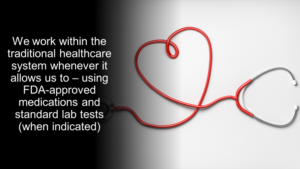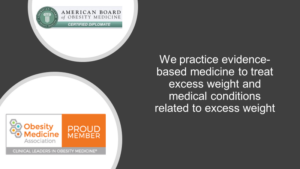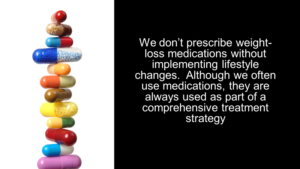What to Expect:
What You Won't Find:
FAQs:
What exactly do you do?
We understand your confusion! For reasons we can’t quite figure out, there are very few offices like ours in the country. Heartland Weight Loss is a doctor’s office where we focus on a subspecialty of medicine – but instead of specializing in lung disease (Pulmonology) or heart disease (Cardiology), we focus on excess weight (Obesity Medicine). The science of medicine tells us that excess weight is a symptom of a deeper problem – something called cardiometabolic dysfunction. We work on diagnosing the underlying problem(s) by taking a thorough history and gathering data (labs, measurements, body composition analysis) then we use a variety of tools gathered from the disciplines of nutrition, pharmacology, and psychology to craft a treatment strategy. We take a comprehensive approach and work well upstream of the problem of excess weight. We often use FDA-approved anti-obesity medications, but they are not a required part of treatment. We do not perform bariatric surgical procedures.
Who will I see?
Our medical team is comprised of Obesity Medicine Specialists – doctors and nurse practitioners with advanced training in the field of Obesity Medicine. We also have a nutrition coach on our team who has degrees in nutrition and kinesiology. Although the clinical team all has a great deal of training and experience in our subspeciality of medicine, just like in other fields of medicine, there is no one-size-fits-all solution or treatment protocol. Each practitioner approaches treatment using evidence-based guidelines, however, the strategies they deploy may vary slightly from person to person. We encourage our patients to meet everyone on the team and figure out who they fit best with.
How many follow-up visits will I have?
We won’t know this until we get there! Everybody is unique and everyone’s weight-loss journey is individual. In the beginning, during active weight loss, we typically see you 2-3 times per month (don’t worry, some visits can be virtual!) Once we get close to weight maintenance, we typically space visits out to every month and then, someday, even further. Our goal is to get you to regular yearly checkups – although everyone reaches that goal on their own timeline.
How does it work?
That’s difficult to answer without taking you down a hundred rabbit holes. Excess weight (abnormal fat storage) is usually the symptom of a much deeper metabolic problem. Until we can get that problem corrected, efforts to lose weight are rarely going to be successful. Rather than try to starve you again (most of our patients have tried that many, many times), we work upstream to correct the underlying problem. Although the process is often fairly simple, it’s rarely easy to execute. The world around us isn’t set up to help us make lifestyle changes and implementing the necessary changes can often be a difficult process. It requires tremendous support – medical, emotional, and psychological. Often, adding an anti-obesity medication to these other support pillars can make the lifestyle changes much easier to implement.
Can I use my health insurance?
Maybe. We believe the treatment of obesity should be covered under the umbrella of the traditional healthcare system. However, not all insurance carriers feel this way. They are allowed to exclude certain things, such as some or all treatments for obesity, including medical services, medications, and/or surgery.
Understanding what your insurance plan will and will not cover is your responsibility (and isn’t always easy to figure out). The best way to look at it is this: health insurance represents a contract between you and your insurance company. The contract specifies several things that you need to be aware of:
-
What type of services are covered by the contract (and which are excluded)
-
Which providers are in-network. (Being in-network means that the insurance company and the providers have agreed to a predetermined fee schedule for services. This protects you and your insurance company from being obligated to pay outlandish fees for in-network providers, but it does not guarantee that the insurance company will pay the fees)
-
What portion of the services that each of you is obligated to pay (deductibles, copays, coinsurance, etc.)
We are currently in-network with all major commercial health insurance companies. Effective January 1, 2024, we will no longer be in-network with any Blue Cross plans. We are NOT in-network with Medicare, Medicaid, Tricare, Sunflower, Ambetter, or most of the plans available on the health exchange.
However, because we are not privy to your individual contract, it does not mean that everything we provide will be covered under that contract. Depending upon your particular policy, some (or all) of the services we provide will not be covered under your policy. It is up to you to understand what is covered.
Because so many companies have started excluding treatment of obesity and copays keep getting higher and higher, it’s often less expensive (and less risky) to move obesity treatment out from the umbrella of health insurance. We believe quality obesity treatment should be affordable and accessible and we are proud to be able to offer our services at very reasonable rates. See our pricing page for full details.





















